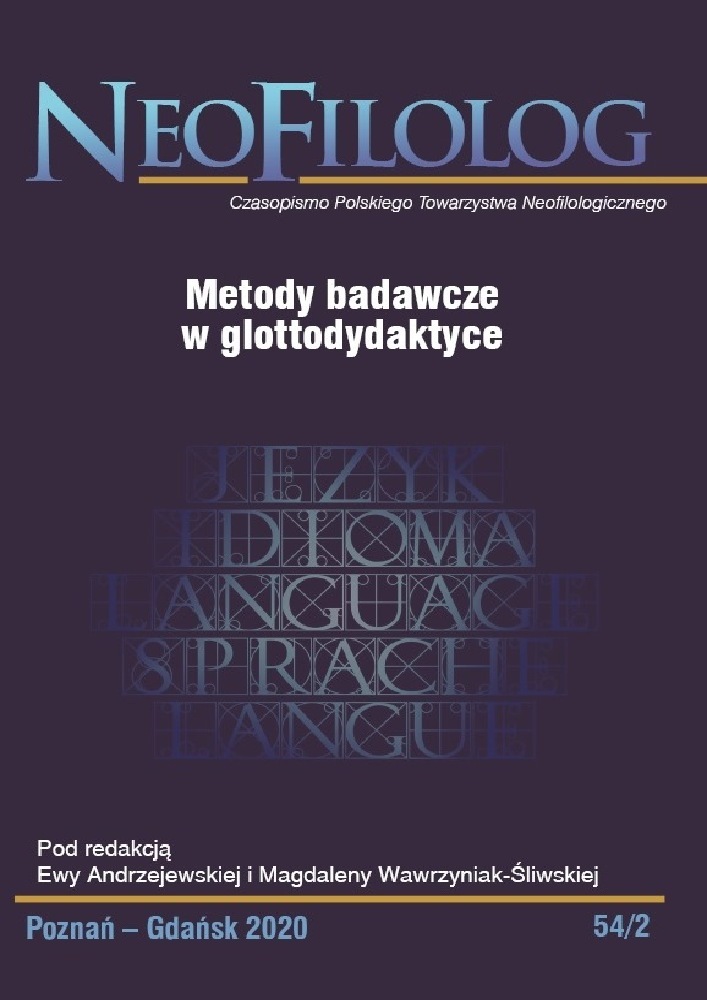Abstract
In pre-service training for teachers of English opportunities for dialogic interaction (Skidmore and Murakami, 2017) with a mentor are seen to play an important role in professional awareness and development (Wallace, 1993; Gabryś-Barker, 2012; Howard and Donaghue, 2015). To fulfil the demands of their practices student-teachers work with a number of different people: a school teacher (mentor), academic supervisor and the academic staff who lead the English teaching methodology course (Blaszk, 2015). This being the case, it was hypothesized that teaching practices might exist as a community of practice within which student-teachers in interaction with these different people would be supported in their professional development. The aim of the qualitative research reported in this paper was to discover how the student-teachers in a particular institution perceived their teaching practices and whether or not those practices could be viewed as a community of practice that supported the students.
Literaturhinweise
Blaszk M. (2015). Between didactics, the mentor and the pupils: Trainee reflections concerning their teaching practices. Neofilolog 45/1: 9-25.
Edge J. (1992). Cooperative Development. Harlow: Longman Group UK Limited.
Gabryś-Baker D. (2012). Reflectivity in Pre-Service Teacher Education. A Survey of Theory and Practice. Katowice: Wydawnictwo Uniwersytetu Śląskiego.
Howard A., Donaghue H. (eds.) (2015). Teacher Evaluation in Second Language Education. London: Bloomsbury Academic.
Mason J. (2002). Qualitative Researching. London: Sage Publications.
Skidmore D., Murakami K. (eds.) (2017). Dialogic Pedagogy: The Importance of Dialogue in Teaching and Learning. Bristol: Multilingual Matters.
Sullivan H. S. (1953). The Interpersonal Theory of Psychiatry. New York: W.W. Norton & Company, Inc. Teaching Practice Information. Retrieved 17/02/2018, from https://fil.ug.edu.pl/wydzial/instytuty_i_katedry/instytut_anglistyki_i_amerykanistyki/praktyki/praktyki_nauczycielskieteaching_work_experience [DW 18.08.2019]
Wallace M. J. (2008). Action research for Language Teachers. Cambridge: Cambridge University Press.
Wallace M. J. (1993). Training Foreign Language Teachers. A Reflective Approach. Cambridge: Cambridge University Press.
Wenger E. A Community of Practice. A Brief Introduction. Retrieved 15/12/2014, from http://wenger-trayner.com/introduction-to-communities-of-practice/[DW 12.01.2020]
Wenger E. (2002). Communities of Practice: Learning, Meaning and Identity. Cambridge: Cambridge University Press.
Wilczyńska W., Michońska-Stadnik A. (2010), Metodologia badań w glottodydaktyce. Wprowadzenie. Kraków: Wydawnictwo AVALON.
Lizenz
Copyright (c) 2020 Neofilolog

Dieses Werk steht unter der Lizenz Creative Commons Namensnennung - Keine Bearbeitungen 4.0 International.
Autoren:
Die Autoren der zur Veröffentlichung in der Zeitschrift Neofilolog angenommenen Texte sind verpflichtet, den Vertrag über die Erteilung einer kostenlosen Lizenz für die Werke mit der Verpflichtung zur Erteilung einer Sublizenz CC auszufüllen, zu unterzeichnen und an die Adresse der Redaktion zurückzusenden.
Gemäß Vertrag erteilen die Autoren auf die in der Zeitschrift Neofilolog veröffentlichten Texte der Adam-Mickiewicz-Universität in Poznań eine nicht exklusive und kostenlose Lizenz und erlauben die Verwendung der Sublizenz Creative Commons Attribution-NoDerivatives 4.0 International (CC BY-ND 4.0).
Die Autoren behalten das Recht zur weiteren freien Verfügung über das Werk.
Benutzer:
Interessierte Onlinebenutzer dürfen die seit 2017 veröffentlichten Werke unter folgenden Bedingungen nutzen:
- Anerkennung der Urheberschaft - die Verpflichtung, zusammen mit dem verbreiteten Werk Informationen über die Urheberschaft, den Titel, die Quelle (Links zum Originalwerk, DOI) und die Lizenz selbst bereitzustellen;
- ohne Schaffung abgeleiteter Werke - das Werk muss in seiner ursprünglichen Form erhalten bleiben, ohne Zustimmung des Autors dürfen keine Studien, beispielsweise Übersetzungen, verbreitet werden.
Die Urheberrechte aller veröffentlichen Texte sind vorbehalten.
Sonstige:
Die Adam-Mickiewicz-Universität in Poznań behält das Recht auf die Zeitschrift als Gesamtheit (Layout, Grafik, Titel, Umschlagsprojekt, Logo usw.).

